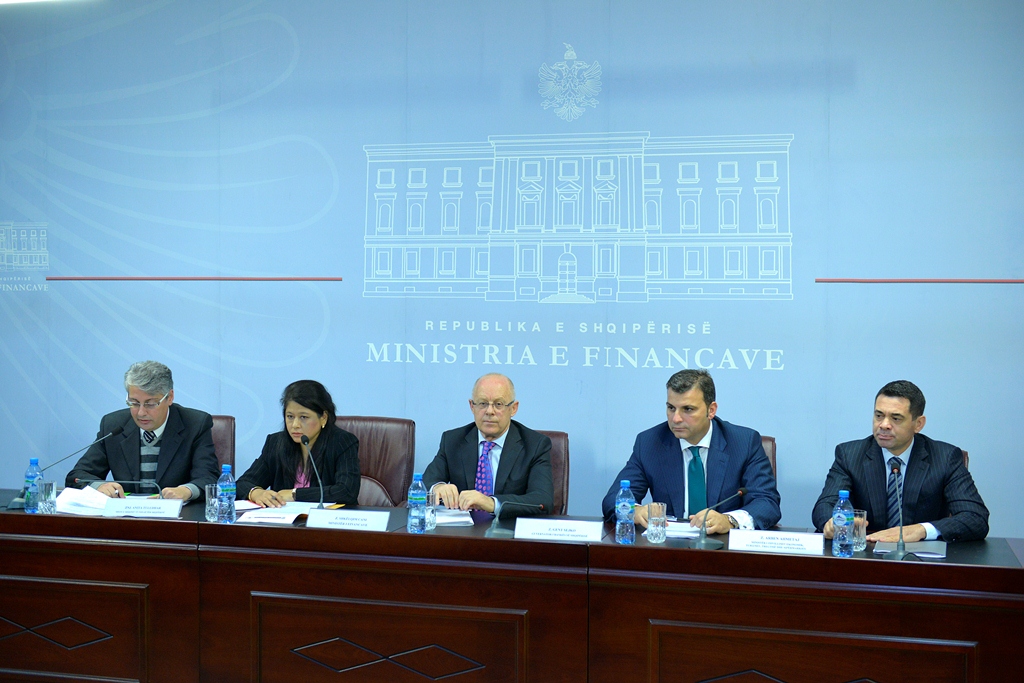BANK OF ALBANIA
PRESS RELEASE
Statement by Governor Sejko at the joint press conference with the IMF mission, Albanian MoF and MEDTTE
Publication date: 10.11.2015
On the conclusion of the Fifth and Sixth Review of the arrangement with the IMF
Dear media representatives,
In the last two weeks, we have been engaged in intensive talks with the IMF Mission. As always, discussions focused on the exchange of views about economic and financial developments, and the efforts to identify the appropriate policies and instruments for moving forward, towards the country's sustainable development.
Overall, we shared with the Mission convergent views in relation to the issues we are currently facing, policies and reforms that we need to undertake, as well as the proper coordination and prioritisation. Following is a summary of the Bank of Albania's opinion.
The Albanian economy registered positive growth rates in the first half of the year. Preliminary data suggest that these rates will persist in the second half. The Albanian banking system remains solid, characterised by good liquidity and capital levels. Developments in Greece had no contagion effects on our financial soundness indicators, reflecting thus the public confidence in the system and the impact of the measures undertaken by the Bank of Albania.
The Albanian economy, however, continues to operate below its potential and inflation remains below the Bank of Albania's 3% target. The growth pace is still insufficient for ensuring full employment and its sources are not yet consolidated. Also, the external environment remains challenging, the high uncertainty continues to dictate consumption and investments, and credit growth stands below the desired levels.
In response to this situation, in the last meeting of the Supervisory Council, the Bank of Albania decided to further increase the monetary stimulus by lowering the key interest rate to 1.75%. This move aims at reducing financing costs and boosting consumption and investments. Taking into account the expected disbursement of the Eurobond, the Albanian financial system is expected to operate against the backdrop of ample and low cost liquidity, during 2016 and beyond. In the meantime, economic activity is expected to return to potential and inflation to target within the medium-term horizon.
But, to realise this scenario, measures in the following aspects need to be taken:
- Maintaining the actual stance of macroeconomic policies. The Bank of Albania deems that the actual composition of macroeconomic policies, based on the stimulating monetary policy and consolidating fiscal policy stance, is the right one for the Albanian economy. At the same time, this composition will ensure economic growth and mitigate the risk arising from public debt levels. The Bank of Albania will continue to maintain a stimulating monetary policy stance, for as long as inflation has not firmly returned to target.
- Reducing uncertainties and improving the business climate, across all the segments of the economy. From our analyses, uncertainty is one of the reasons that continues to decelerate consumption and investments in Albania. Its mitigation, by enhancing transparency and fostering political consensus, would help establish a more favourable environment for economic growth.
- Boosting lending, by reducing credit risk. As we have previously stated, the implementation without delay of the national platform for addressing issues related to non-performing loans, is a necessary step for turning lending into a sustainable and efficient source of financing the Albanian economy.
- Albania's outlook remains positive, but sustainable growth requires a combination of the short-term economic stimulus with the long-term structural reforms. With regard to structural reforms, I would like to underline some of the concrete commitments of the Bank of Albania, as the monetary authority, in the framework of the arrangement with the IMF. The Bank of Albania will:
-
continue to exchange information and cooperate with the European Banking Authority and other counterpart institutions, to coordinate supervisory measures and regulatory practices;
-
review some regulatory requirements, to promote restructuring, cleaning or sale of non-performing loans from banks' balance sheet;
-
take further measures to improve the functioning of the Credit Registry.
Concluding, I would like to thank the IMF Mission for their honest discussions and cooperation.
Thank You!


 Twitter
Twitter
 Youtube
Youtube
 Facebook
Facebook
 Flickr
Flickr
 RSS
RSS
 Subscribe
Subscribe
 Feedback
Feedback